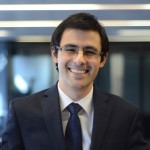Beyond the classroom: Tackling real world risks

Professor John Hull, Co-Director of the Master of Financial Risk Management (MFRM) program at the Rotman School of Management. Towards the end of 2017 he sat down with three current students to talk about their views on risk management. He has caught up with them recently to see if their views have changed now they have completed their risk management project.
For the last two months, the students have been tackling a real business issue that is relevant for various industries. These project placements took the students out of the classroom and into industry, where they worked in-house with practicing risk management professionals, broadening their skills and preparing them for employment on graduation in the summer.
Our highly sought-after MFRM Graduates will be available to begin working full-time in May 2018. Interested in hiring a Rotman Master of Financial Risk Management graduate at your organization? Connect with us to receive a copy of our MFRM Class of 2018 Resume Book
Meet the students
 Adam Albogatchiev (AA)
Adam Albogatchiev (AA)
Bachelor degree: Mathematics and Finance
Work experience: Market Data Services Summer Intern, TD Securities, Global Risk Management, Retail Credit Risk Summer Associate, Scotiabank
MFRM project: Bank of Canada
 Joanna Leung (JL)
Joanna Leung (JL)
Bachelor degree: Financial Economics
Work experience: Research & Analysis Intern, Ontario Securities Commission, Bilingual Financial Services Representative, CI Investments
MFRM project: McKinsey
 Dildar Ghotra (DG)
Dildar Ghotra (DG)
Bachelor degree: Mechanical Engineering, MBA in Finance
Work experience: Manager, Investment Banking, SBI Capital Markets
MFRM project: Ontario Teachers’ Pension Plan
How did you find the project?
JL - I feel I’ve been launched out there in the real world, I’ve seen things I’d not previously been exposed to during my internships. The culture at McKinsey helped with this - it was all about owning your own work stream. We were only students, but they would list us in the project teams as risk experts. This showed the degree to which they were expecting us to work at and to deliver. It really made an impact. It showed me the image that people get from students of the program, and what I’d have to live up to once I graduate. It has been intense, but it was a fantastic learning experience.
AA - I learned a lot more about risk management as a field and in a more practical sense. Working with real-world data, where everything isn’t as clean as it is in the classroom, where there is a relatively obvious answer, to dealing with ambiguities where you don’t know what the answer is – that was definitely an interesting experience.
What did you do during your project?
AA - Our project was examining how news announcements affected the Canadian FX market. Seeing how the surprise announcements, deviations from what was expected, what impact they caused into the exchange rate - how big they were, and how long they lasted.
A great result was when we’d sorted the data and were able to produce the first few graphs and charts; we could start drawing some conclusions. The next day we were able to run some regressions, comparing and contrasting, and realizing ‘OK, this is a really interesting result, this isn’t what we expected, or this was what we expected’.
JL - Essentially, in my project we worked on the data visualisation of a global operational risk dashboard. We had to come up with the metrics to enable the users of the dashboard to identify operational risk based on various criteria. It would be use internally, or perhaps externally, by the clients to increase efficiency.
We used our operational risk class a lot. Many applicable skills that the professor (who is the CRO of Citibank in Canada) taught us in the class was useful. He taught us how structure is important, the proper way to communicate to senior staff, how everything we do has to adhere to a certain framework. That was the key part that we made use of during the project.
DG - During the project, we implemented one particular model, Break-even Volatility Model by Bruno Dupire. This model was not directly applicable to real world, because it does not tell how far in past we should look to forecast the future. We came up with a solution to this problem by using ideas from one of our classes. We used the idea of auto-correlation of realized variance which we studied in our market risk course. So, we got the idea from that concept and applied it to check the auto-correlation of realized variance for 1 month, 2 months, 6 months, the maturities of options, and applied the results to the model and got final results, which were more applicable to real world. The most satisfying thing was that we used what we learned in a course at Rotman and applied it to a real-world problem. The people at OTPP were really impressed by that idea, it wasn’t something that had been done by the original author of the paper. They are going to use the results we had from our project for valuation and mark to market of variance swaps.
What do you think the future holds for risk management?
DG - Other risks are becoming important, other than financial risk, such as cyber security., and there are other changes in the market, like bitcoin. At the moment, we don’t know if it will become a ‘real’ currency, but if it does then there will be huge changes in how the financial markets work.
I used to think risk management as a stand-alone area. However, now I feel it is more integrated with other areas. For example, I could see how it is linked to investments at the pension fund. There is always a trade off between risk and return, and if you understand risk properly, you understand the return, and if you can make the returns that means you are good at your job. I could really see the relationship between risk and return working there.
JL - In the MFRM program we learn about how things are structured, how companies assess risk, the role of a CRO, everything is clear-cut. But then, in reality I found out that some organisations do not put risk at the forefront of their C-suite as much as we realise it’s importance from the program.
I can definitely see certain areas that could benefit from the skills of a risk manager, some of which are being developed in this program.
What are your current career plans?
JL - The master program makes you realise you have the freedom to do whatever you want, and you have the resources to do whatever you want equipped with a specialized degree. Now it’s your choice, everything is up to you, you have everything you need to succeed, it’s what you make of it. In undergrad you can shelter yourself from it, upon the masters you cannot.
Due to my project I’m shifting more towards consulting as it could give me exposure to many different industries. I think it would be a great way to develop – I’ve seen how other consultants and business analysts have developed in a certain way – I want to work where I have the opportunity to develop this type of expertise.
DG – They have not changed much, but now I have more clarity. When we spoke before I was interested in asset management, because I had skills which are transferable to there. That was the idea. Now, having worked at an asset management firm, which is a pension fund, I’ve got more clarity. I want to get into a role which looks at financial markets – I’d be able to use my previous skills as well as the skills and knowledge I’m developing in the program.
I think the things that we are learning in the program can be transferable to roles broader than just risk.
AA - This was my first time working in a research position. I definitely enjoyed it. If I have the chance to do some research in the future it would be something I’d serious consider. Working for the Bank of Canada was a great opportunity for sure. Before the project I said before that I like quantitative work, during the project I did a lot of that; programming, working with data. I’m more confident I want to pursue a career in that direction.
Meet the future risk rising stars
Find out about hiring our graduates by contacting us at MFRMCareers@rotman.utoronto.ca. Our MFRM resume book profiles all students from our Class of 2018.